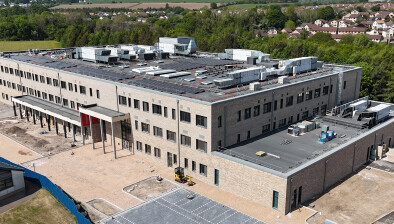Robertson Group targets profitability and value following record £298m turnover

Robertson Group has reported a record turnover of £298 million and a pre-tax profit of £11.77m as it nears the end of a five-year plan focused on growing sustainable, long term value and profits.
The 14 per cent turnover jump has enabled the construction and infrastructure firm to increase its staff by 15 per cent to now employ over 1,700 people.
Highlights in the Group’s full year results for the period to the end of March include a 12 per cent turnover rise in the company’s construction division to £217.6m; the addition of civil engineering and building services businesses to the portfolio; the launch of Robertson Tayside; increasing Robertson Homes sales by 78 per cent; increasing Robertson Facilities Management turnover to £38m and growing Robertson Timber Engineering sales by 55 per cent.
Announcing the results, executive chairman Bill Robertson CBE, who founded the business in 1966 said: “These results are testament to the work the Group has undertaken in the last five years. I believe our regional business model has been our strength in recent times, where each autonomous business can react to their own local markets in good times or bad and is under no pressure to grow unless good value can be gained from their workload.
“Following the end of PFI procurement our business has spent the last five years growing, developing and managing its way through a changing marketplace by using those skills learned in the previous 15 years of PFI work.”
The Group describes itself as an infrastructure business providing solutions right across the built environment sector including, construction; investment; property development; facilities management; private and affordable house building; timber frame and specialist services.
Robertson started his eponymous business in his home town of Elgin in the North East of Scotland. The geographical reach of the business now expands as far south as Yorkshire and the East Midlands where it has enjoyed opportunities to expand the regional business model. With this in mind, as part of the five year plan, Robertson has created two distinctive, autonomous construction groups covering Scotland and England.
The Group has focused on creating high value businesses, targeting a 5 per cent net margin across the group led by a team of top people.
Bill Robertson believes companies like his have been compromised in recent years in a number of ways, not least from the demands of banks seeking an urgent exit from companies where lending on property etc affected their trading requirements resulting from the banking crisis.
He added: “Many good companies were forced out of business as a result of the upheaval in the banking sector and some of those who survived either lost control or equity in their businesses. The recession which followed the banking crisis also impacted on the sector where companies were encouraged to trade at unsustainable margins hoping the recession would be short lived. And the recent spate of poor results from major UK construction companies hasn’t helped the perception of our industry.
“Over 60 per cent of Robertson Group revenue is generated from construction operations where margins, historically, have been low. There are fewer players in the market and more frameworks and opportunities to work on with clients and their advisers up front. There is a real opportunity to raise margin levels to more sustainable levels.”
Robertson believes that accepting that, and growing their offering of higher value related product, the industry could raise profit levels closer to the norm in other sectors bringing value and respect back to the industry.
Bill Robertson is also adamant that the sector needs to re-engage with direct employment and training at all levels to improve security of supply, underlining the crucial part that construction plays in the country’s economy.
“Construction as a sector has gone through continual change over the last 20+ years where most major players in the industry slowly moved to becoming growth driven management contractors. The knock-on effect was these companies began operating at lower margins, directly employing and training fewer people and delivering major projects through a pool of growing subcontractors.
“Training and development of management and trade operatives hasn’t kept pace with the market demands. We have taken proactive approach in investing in youth training and development, as we look to grow a talent pool for the future. Most companies now recognise this and many see a recovering economy as real opportunity to rebuild value and a creditable position in today’s market.
“On the eve of our 50th anniversary and as we prepare for our next five year plan we are looking forward to a period of opportunity and sustainability across the sectors where we operate. This is an exciting new phase for Robertson and our sector.”

















